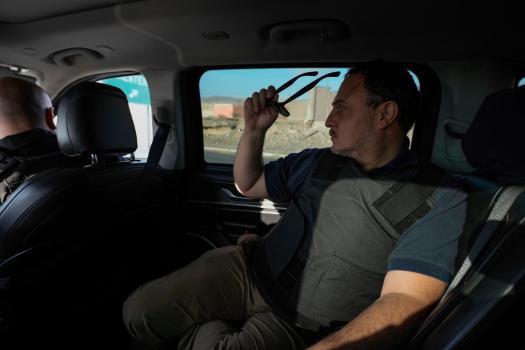BY NAYARA BATSCHKE AND ISABEL DEBRE
Chile’s ARICA (AP) Even the smallest purchases made by the Venezuelan gang members were recorded in blue pen: $15 for an Uber driven by a drug trafficker; $9 for instant coffee while on watch; and $34 for supplies to sanitize what investigators discovered to be torture chambers.
A multinational’s accounting system is suggested by the thorough spreadsheets that were found during police raids in the northern Chilean town of Arica and given to The Associated Press.
They are the most thorough documentation to date of the inner workings of the legendary criminal organization known as Tren de Aragua, which President Donald Trump has classified as a foreign terrorist organization.
In contrast to Trump’s mass deportations of suspected gang members, the years-long investigation conducted by Chilean prosecutors in Arica led to heavy sentences for 34 individuals in March and sparked additional cases that earlier this month sentenced a dozen Tren de Aragua leaders to a total of 300 years in prison.
Trump’s followers applaud the expulsions, but investigators see lost chances to collect evidence that might have helped dismantle the criminal network that has grown stronger throughout the region as migration from Venezuela increases and the demand for cocaine rises globally.
“The U.S. snatching guys off the streets is just the tip of the iceberg,” stated Daniel Brunner, a former FBI agent and president of the security firm Brunner Sierra Group. They aren’t examining the group’s operations.
Transnational mafias have consolidated power in countries like Honduras and Peru and generated an unprecedented crime wave in once quiet countries like Chile. They have also infiltrated official bureaucracies, severely impairing law enforcement’s capabilities, and endangering regional stability.
Democracies throughout Latin America are being put to the test by the recent occurrences.
Regarding the impunity in his nation, former Peruvian Interior Minister Ruben Vargas stated, “This is not your typical corruption involving cash in envelopes.” The political system is being dominated by criminal operators.
According to watchdog Transparency International, Chile has long been regarded as one of the richest and safest countries in Latin America. It is also one of the least corrupt, which gives authorities an advantage in combating this type of organized crime.
But because the nation lacked experience, it was caught off guard when gruesome crimes like dismemberments and kidnappings changed society.
Three years later, specialists present Arica as a case study for broader initiatives to take on the gang.
Critics see an authoritarian police state that has trampled over due process, while others view El Salvador President Nayib Bukele’s fight on criminal gangs as a model.
According to Pablo Zeballos, a Chilean security expert and former intelligence officer, breaking up criminal networks requires financial information, criminal prosecution, witness protection, and international collaboration.
Last year, Chilean prosecutor Bruno Hernández and his team dismantled the gang’s northern Chile branch, known as Los Gallegos, by bringing an unprecedented number of gang members to trial using Tren de Aragua records that were initially seized in 2022.
Last month, prosecutor Mario Carrera from the Los Gallegos stronghold of Cerro Chuo, an Arica slum, said it was a milestone. They were operating with impunity up to that point.
In 2021, Tren de Aragua invaded northern Chile when the epidemic closed borders and pushed Venezuelans to use smugglers to escape their country’s problems and travel to Peru, Colombia, and Chile.
H.ctor Guerrero The flower The commander of Tren de Aragua, known by his alias Ni o Guerrero, sent managers to seize control of coyote networks that were transporting people across Chile’s desert borders.
According to Ronna R. Squez, who wrote a book about the group, it was uncharted ground from their point of view.
Related Articles
-
UN report reveals alarming rise in Africa s food insecurity despite global improvements
-
Cyberattack on Russian airline Aeroflot causes the cancellation of more than 100 flights
-
Israeli strikes kill 36 in Gaza, including a mother and newborn, as more aid is allowed in
-
Kim Jong Un s sister rejects outreach by South Korea s new president
-
Trump says he wants Netanyahu to make sure they get the food in Gaza amid humanitarian crisis
In Cerro Chu o, a former toxic waste dump outside of Arica where Venezuelan migrants live in cramped, box-like houses, Tren de Aragua established roots.
According to locals, criminals demanded protection money from store owners and used violence against those who refused to pay.
Saida Huanca, 38, recalled how Los Gallegos extorted her minimarket coworker and dispatched a man with a knife to collect road tolls, saying, “We live in fear of them.” I stayed inside the house.
Turncoats and rivals were terrorized by the gang.
According to court documents, members tied up defectors and recorded them while they sliced fingers and shocked them in secret torture chambers.
AP was able to get intercepted calls from March 2022 that reveal a rival in a panic over Tren de Aragua’s arrival. Dude, where am I meant to run? Marco Iguazo, a Chilean mob boss, is heard inquiring.
They discovered, shot, or dismembered bodies and packed them into luggage. A lot of people were buried alive beneath cement.
Carrera, who noted that Arica homicides increased 215% between 2019 and 2022, described it as complete madness.
Last month, the AP saw Hernandez try to get Wilmer L. Pez, 23, to speak at the investigative police headquarters in Arica. The alleged hitman from Los Gallegos remained silent while staring at his Nikes.
Members typically don’t work together on investigations. Hernndez’s primary source of support, in the absence of witness, was bookkeeping records. They exposed a strict bureaucracy that allowed small cells autonomy under centralized control.
According to paralegal Esperanza Amor of Hernndez’s team, “we had to prove not only that they committed crimes, but that there was a structure and pattern.” They would have been tried as ordinary criminals otherwise.
According to documents, the gang’s main revenue streams were sex trafficking and migrant smuggling.
Each cell copied the same structure, although the cost of sex varies by city, ranging from $60 in Arica to over $100 in Santiago, the capital. As a kind of debt bondage, the gang took half of the women’s wages and then withheld food and rent.
According to salary tables, regional coordinators might make up to $1,200 each month. Each job might earn hitmen $1,000, plus protection for family members in Venezuela. Christmas bonuses of $200 were given to the majority of operatives.
In order to decipher the gang members’ use of emojis, investigators used drone surveillance to cross-check their messages.
Some, like the snake that represents a traitor, were self-evident. Others were less so: a raincloud signaled an impending raid, a pineapple represented a safe haven, and a bone represented debt.
The killing stopped when the defendants were taken into custody; Arica’s homicide rate fell from 17 per 100,000 residents in 2022 to 9.9 per 100,000 last year.
Authorities took notice after the team obtained 34 convictions on counts ranging from sexual exploitation of minors to human trafficking and serious homicide.
Similar inquiries spread across the country. Carrera went to Washington to provide the FBI with intelligence.
According to Ignacio Castillo, director of organized crime at Chile’s public prosecutor’s office, the unit accomplished something that had never been done in the country before and produced results.
It has been difficult for other nations to bring charges against Tren de Aragua.
Some migrants have been arrested for little more than tattoos, and the Trump administration has used the gang as an excuse to deport them.
According to experts, the Justice Department is too preoccupied with mass expulsions to carry out in-depth investigations.
“We’re not doing those kinds of years-long investigations,” Brunner added. I believe that organized crime is benefiting from the present deportation strategies.
Following Los Gallegos as they reassemble behind bars is the next task for Hernandez’s crew. According to certain Cerro Chuo businesses, jail phones continue to threaten them with extortion.
According to Hernndez, organized crime will always change. We must move forward.
As Marxist President Gabriel Boric, a former student protest leader, fights for his legacy ahead of the November presidential elections, there is growing support for a more brutal approach even as the country’s homicide rate declines. According to polls, voters’ #1 worry is security.
Jose Antonio Kast, a far-right contender who takes inspiration from Trump and Bukele, is currently the front-runner. At whatever costs, he promises to erect a border wall and deport unauthorized migrants.
Maria Pe a Gonzalez, 70, said she voted for Kast while she was watching her grandkids play outside an Arica church.
She said, “You can’t walk at night like you used to.” Since a variety of people began to arrive, Chile has evolved.















